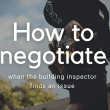Tenders have become a popular way of selling residential real estate. In fact, Tender is the selling method of choice in some parts of New Zealand, particularly Wellington.
As a buyer, trying to buy a home via Tender can feel like a total crapshoot. You pick a price to offer, without knowing what other buyers are putting down, you stick your offer in an envelope and cross your fingers hoping for the best while you wait to hear back from the agent.
Why are Tenders so popular?
Well, largely due to it being a seller’s market. When houses are selling relatively quickly and most properties are attracting multiple offers, it becomes incredibly hard to accurately predict selling prices. In a rising market, salespeople are constantly being surprised by what properties end up selling for. If owners choose to market their property without some sort of deadline, they could be costing themselves tens of thousands of dollars by under-selling their home.
So where does this leave you as a buyer? Tenders are hard work, there is no way around that. You get one chance to offer on the property you love and usually no opportunity to negotiate. How tough is that? I have bought 2 homes through Tenders myself and have spent many a long night calling hundreds of disappointed buyers to tell them they have just missed out on the home they had their heart set on by a few thousand dollars, so I know your pain.
Unfortunately, tenders work for most owners and can generate great results so they will continue to be the selling method of choice for many homeowners.
How to win a Tender…
I imagine you’re reading this because you have set your heart on a home. It feels like the one. You can see your unborn children playing in the back lawn. Now it’s time to figure out how you can tip the odds in your favour. Here are 6 tips to help you win your next tender…
1. Don’t let the ‘perceived’ competition scare you off.
Far too many people go to a busy open home and decide they simply don’t have a chance “because there were 30 other people there!” In my experience 30 people usually equates to 1 or 2 offers so don’t count yourselves out just because there were lots of shoes outside the front door. Many of those buyers either aren’t yet ready to buy, can’t afford the house, don’t like it or are just nosy neighbours. Besides, if you don’t try (ie. put in a Tender) you will never know, right?
2. Don’t be like “The Warehouse” with your pricing.
This is an epic rookie mistake and I see it constantly. If you are trying to buy a home and you think it is worth approx $400k, do not under any circumstances offer something silly like $399k. I know it feels better to be “in the 300’s” but it could very well end up costing you the house. An offer of $401k looks infinitely better than $399k but is only slightly different (in the scheme of things). The
Warehouse wants to make their products look cheap. You want to do the opposite – you want to make your offer look huge! More importantly, you want to be slightly better than the other buyers who don’t read this tip and end up offering $399k so you can beat them!
3. Pick an uneven number.
Continuing the theme above – I have seen far too many people miss out on a house by a few hundred dollars and it is gut-wrenching when it happens. Never offer an even number (like $400k). Always offer something unusual like $403,750. Even numbers look plucked out of thin air and make it look like you could afford more if you wanted to. Uneven numbers make it look like you are pouring every last cent into this offer to make it work and owners love this! Plus you will beat the other buyer that puts down a plain old even number.
Read: Why you should be using a mortgage broker.
4. Cross out a few lower numbers.
It might sound like a gimmick but this really works. Usually, while waiting for tender day to roll around your offer price goes up. You end up offering more than you originally planned to because you don’t want to miss out. Show the owners this progression on your tender form. It sends a really good message. Your offer should look something like this:
$390,000 $400,000 $401,750
This also greatly reduces the chances of the owner coming back to ask you for money – they can already see you have raked yourself over the coals to get to this price.
5. Attach a handwritten letter.
In all seriousness I have seen owners accept the 2nd highest offer, sometimes forgoing thousands of dollars because one of the buyers attached a hand-written letter to their offer explaining how much they love the home, telling the owner a little bit about themselves and generally pulling at the heartstrings. Owners love this stuff and many of them genuinely want their home to go to someone who is going to love it as much as they have. Money is not the no.1 driver for many people.
6. Shorten or deal with your conditions before offering.
I can’t advise buyers to remove conditions when they come in to make an offer. However, most winning tenders are unconditional. Motivated buyers who have missed out on other homes will go the extra mile to get themselves into position to make an unconditional offer. To compete with them you are going to have to try and get yourself in the same position.
Yes, it can be expensive talking to a lawyer to get a title search done and getting a building inspection organised before offering certainly isn’t cheap. Buying a house is a big kid’s game though and if you want to have a chance on the premium properties that are out there you will need to spend a bit of money up front and make your offer as clean as possible.
Read: How to make unconditional offers
Always remember you are buying a home worth $400k, $600k, $800k (or more). You would never buy a business worth that much without spending some money on due diligence.
If you need to have conditions – put the shortest possible time on them. 5 working days looks a heck of a lot better than 10 working days. Builder inspectors, valuers, solicitors and mortgage brokers will usually come to the party and organise things very quickly if you smile and ask very nicely.
In Conclusion…
Think about how you can make your offer stand out. While price will be the no.1 factor for many owners, small details can sway things in your favour when there are multiple buyers involved and there isn’t much difference between your offer and the next.
It isn’t uncommon for an owner to accept the second highest offer because it had fewer conditions, a better settlement date, or a personal touch. Keep that in mind next time you submit a tender and hopefully you will come out on top.
Need help specific to your situation?
Book a one-on-one consultation online.
Want to fill in the tender form yourself?
This video will talk you through filling in the standard tender document, step by step…
//www.youtube.com/watch?v=qFytBuXJdzU&t=2s
Next read: “How to decide what price to offer…”










Do you need a loan to pay off your bills? Or for your Business if yes Email us opploansllc@gmail.com
This is a great post to know about How to win a Tender.
I thank you for this post you shared because it’s difficult to understand the process tender bids. Many of the tender information portals help in bidding for particular tenders easily online like BidAssist.
Hi Andrew
Interesting article – thank you. Our daughter is looking at buying a house in the Hawkes Bay. It is by tender process. – Unless sold prior. Our daughter is wondering if it would be better to make a pre tender offer instead of putting in an offer via the tender process. Would appreciate your thoughts on this.
Regards
Ali
Hi Ali, thanks for visiting the site. There can be benefits to offering early – everyone else has less time to get their ducks in a row so you may have a little less competition. Also, the owners might jump at the opportunity to secure a sale early in the process and avoid the stress of waiting until the Tender day.
Put it this way – the best results I have seen (for owners that is) have always come about when they wait until the Tender date to accept an offer. So if your daughter can secure the home early, it may be a good thing!
Thanks so much for your blogs. I’m a first time buyer at 47. It’s been an incredible help as I take the terrifying leap. Not quite there yet but hope to be soon.
Hi Justine, thanks for your message! Best of luck with your search. Let me know if I can help in any way.
I like this article
How about deadline sales when there is no other offers. It seems deadline sales are to the benefit of the vendor not the buyer
For all intents and purposes aren’t these the same?
And, can’t unscrupulous RE salespersons just lie if you are the only one and say that there are other offers and would you “like” to increase it? I’ve heard anecdotally that this has happened and egg on the face of RE person when it was relisted… with another agency.
Sadly, I have also heard of this happening. Would love to find a way to add more transparency to the multi-offer process. A file storage system that notifies buyers as to when their offer document is opened, downloaded by the agent or the owner would be a good start.
Hi Andrew
you website i just stumbled across, as a first time buyer on my own i was already a bit over the process…your advice just gave me a massive boost though and lots of food for thought, thanks for the tips, i look forward to checking out more of your articles
We just won the first tender we put in thanks to your advice …. it was the letter that did it! Thank you Andrew! I will recommend your blog and ideas to others.
Thank you! My husband and I are putting an offer in this week on a deadline treaty in the Waikato, and having missed out on a couple already, we are going to try the letter and the crossed out numbers! I don’t know why I have this perception that we’re being cheeky by trying to pull on the heart strings but we love the property and we are willing to try anything 😀
Thank you Andrew, this article was very helpful. I’m going to try the letter to the vendor in our next offer – great advice.
Regards
Arihia
Hi Arihia, thanks for commenting. Best of luck with your next offer! The letter can work really well. I had one the other day where they went back to a couple that were $15k lower than the highest offer to give them another chance just because they had attached a nice letter. A lot of owners are really interested to know who is buying there home and sometimes a positive feeling about a certain person, couple or family can mean a lot more to them than a few extra dollars.
Regards,
Andy